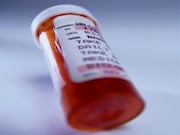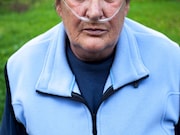Antibiotic Use Tied to Higher Risk for Rheumatoid Arthritis
Findings show a dose- or frequency-dependent association; all antibiotic classes linked to higher odds for RA
As-Needed Inhaler Use an Option for Children With Mild Asthma
Study in African-American children shows symptom-based adjustment of inhaled corticosteroids is feasible
Radiologists Performing More Paracenteses, Thoracenteses
2004 to 2016 saw increase in paracentesis, thoracentesis procedures performed by radiologists
Tuberculosis Rates for U.S. Children Are Low and Declining
Disparities persist by race, ethnicity, geography; incidence higher for those living in U.S.-affiliated islands
Rx Size Predicts Persistent Opioid Use After Cardiothoracic Surgery
Patients prescribed more than 450 oral morphine equivalents have more new persistent opioid use
More Physical Activity at Any Intensity May Reduce Mortality
Higher levels of total physical activity, less time spent sedentary linked to lower mortality risk
Short-Term Exposure to PM10 and PM2.5 Affects Mortality
Risk for daily all-cause, cardiovascular, respiratory mortality up with short-term exposure
Air Pollutants Tied to Significant Worsening of Emphysema
Emphysema assessed quantitatively using CT imaging and lung function for patients in multiple U.S. cities
Cases of Severe Lung Injury After Vaping Reported in Three States
Health care providers should consider vaping as a cause for unexplained breathing problems, lung injury
CDC: Over One-Third of U.S. Youth Exposed to Secondhand Smoke
SHS-exposed youth increased with decreasing family income



















